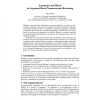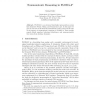EPIA
1995
Springer
14 years 3 months ago
1995
Springer
Abstract. Argument-based formalisms are gaining popularity as models of nonmonotonic reasoning. Central in such formalisms is a notion of argument. Arguments are formal reconstruct...
KR
2000
Springer
14 years 3 months ago
2000
Springer
Bondarenko et al. have recently proposed an extension of the argumentation-theoretic semantics of admissible and preferred arguments, originally proposed for logic programming onl...
ECAI
1992
Springer
14 years 3 months ago
1992
Springer
ABSTRACT. This paper investigates the problem of finding subclasses of nonmonotonic reasoning which can be implemented efficiently. The ability to "define" propositions u...
ECAI
1998
Springer
14 years 3 months ago
1998
Springer
In probabilistics, reasoning at optimum entropy (ME-reasoning) has proved to be a most sound and consistent method for inference. This paper investigates its properties in the fram...
KI
1999
Springer
14 years 3 months ago
1999
Springer
Abstract. The revision and transformation of knowledge is widely recognized as a key issue in knowledge representation and reasoning. Reasons for the importance of this topic are t...
ECAI
2000
Springer
14 years 3 months ago
2000
Springer
Abstract. Defeasible reasoning is a direction in nonmonotonic reasoning that is based on the use of rules that may be defeated by other rules. It is a simple, but often more effic...
ECSQARU
2003
Springer
14 years 4 months ago
2003
Springer
Abstract. Default logic is one of the best known and most studied of the approaches to nonmonotonic reasoning. Subsequently, several variants of default logic have been proposed to...
KR
2004
Springer
14 years 4 months ago
2004
Springer
Humans have always done nonmonotonic reasoning, but rigorous monotonic reasoning in reaching given conclusions has been deservedly more respected and admired. Euclid contains the ...
LPNMR
2005
Springer
14 years 5 months ago
2005
Springer
FLORA-2 is an advanced knowledge representation system that integrates F-logic, HiLog, and Transaction Logic. In this paper we give an overview of the theoretical foundations of th...


